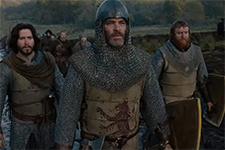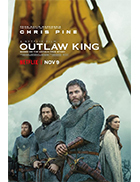Outlaw King
|  After exploring criminal desperation in the Texas panhandle in his superb neo-Western Hell or High Water (2016), Scottish director David Mackenzie has returned to his native highlands for Outlaw King, which tells the story of how Robert the Bruce, Earl of Carrick, fought for Scottish freedom from England in the early 14th century. Most moviegoers are generally aware of this embattled historical period from Mel Gibson’s multi-Oscar-winning Braveheart (1995) about Scottish rebel William Wallace; Outlaw King is a sort-of follow-up to the film, as the opening scenes overlap with and reference events depicted in Gibson’s film. Wallace himself never appears, although he is mentioned several times and part of his dismembered corpse is shown strung up as a warning to other Scots who might dare follow in his path And this is precisely what Robert the Bruce (Chris Pine) decides to do, despite having begrudgingly pledged allegiance to the brutal English King Edward I (Stephen Dillane). Robert has the support of his family, including his wife Elizabeth (Florence Pugh), King Edward’s goddaughter whose life with Robert had led her to identify with the plight of the Scots under the iron, tax-heavy thumb of English rule. Robert’s rebellion is small at first, consisting of only a few dozen men, but it grows over time as he gains the support of various Scottish lords and nobles, including James Douglas (Aaron Taylor-Johnson), who is particularly anxious to stick it to the English because King Edward explicitly denied his request that his lands be returned. Robert is given additional motivation when Elizabeth and his adolescent daughter are captured by the English and used as leverage against him. The pleasure, of course, is in watching the underdogs—the guerilla Scots—undercutting and defeating the powerful English—sticking it to the man, medieval style. Some of the battles are relatively small-scale, as Robert develops a strategy of recapturing Scottish castles one by one and then burning them to the ground so the English can’t retake them, but it all culminates in a massive, muddy, bloody battle in which the tiny Scottish rebel army takes on English soldiers decidedly more multitudinous. Mackenzie is a director who likes to get down and dirty, and the violence in Outlaw King is gritty and gory. Some of the bloodiest elements of battle and torture that Gibson, of all people, left to the viewer’s imagination Mackenzie puts front and center. The film has a sweaty, grimy, bitter-chill, grit-under-the-fingernails sense of realism, and veteran cinematographer Barry Ackroyd (a regular collaborator with Paul Greengrass, Katherine Bigelow, and Ken Loach) finds epic beauty in the misty Scottish highlands (there are images throughout that are breathtaking enough to make you want to pause and stare for a while, which makes the film’s simultaneous distribution on Netflix quite convenient). Unfortunately, though, the film as a whole lacks the powerful dramatic current that made Gibson’s epic—to which Outlaw King is, fairly or not, destined to be compared—so, well, epic. The screenplay by Bash Doran, Mackenzie, and James MacInnes tries to pack in everything it can in just over two hours, and while they have all the right components, nothing fully coheres. Pine, who Mackenzie directed to such great effect in Hell or High Water, holds the center of the film, but is never truly as compelling as his character should be. Pine brings some necessary and affectionate humanity to Robert, but the screenplay gives him too little to work with. Much more interesting is his adversary, the Prince of Wales (Billy Howle), who is a truly despicable usurper determined to prove that he can be even more ruthless than his father. He and Robert have a longstanding rivalry that we first see in the film’s opening sequence (which Mackenzie depicts in a distractingly attention-grabbing one-shot), and the film generates much of its tension from the conflict between Robert’s aspirations of freedom and the Prince’s desire for despotic control. It’s unadorned good and evil, which is almost disappointingly simplistic, especially since Mackenzie’s previous film was a compelling study in moral shades of gray. Here, it’s all black and white and, as a result, a bit of a slog. Copyright © 2018 James Kendrick Thoughts? E-mail James Kendrick All images copyright © Netflix |
Overall Rating: 

 (2.5)
(2.5)


